Sexual Misconduct Response Centre – Annual Report 2019-2020
Message from the Executive Director
Five years ago, retired Supreme Court Justice Marie Deschamps reported that sexual misconduct is a serious problem in the Canadian Armed Forces (CAF). In her External Review into Sexual Misconduct and Sexual Harassment in the Canadian Armed Forces, she provided recommendations on how to address this problem, which led to the launch of Operation HONOUR and to the establishment of the Sexual Misconduct Response Centre (SMRC), an organization that is part of the Department of National Defence (DND), but independent from the CAF. In doing so, the CAF demonstrated a willingness to confront the issue, support its members, and change the underlying sexualized culture.
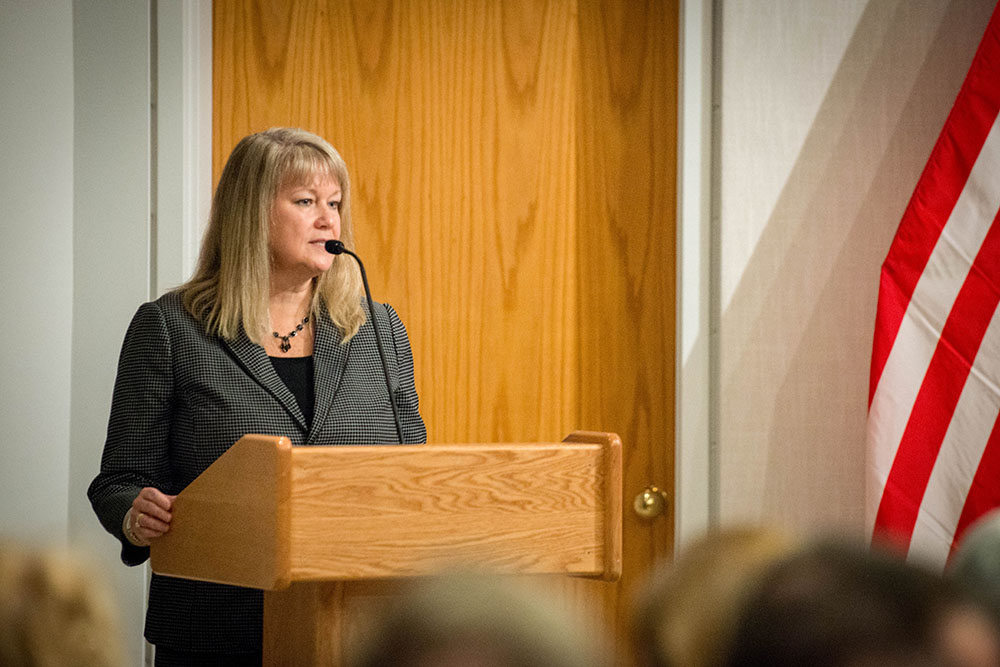
The Executive Director of the SMRC, Dr. Denise Preston, addressing participants of the first Five Eyes forum on sexual misconduct. Photo: CFSU(O) Imaging
It is this same motivation that has propelled us forward ever since, whether it’s refining our support services, developing prevention programs, building and nurturing partnerships, providing expert advice, or expanding our mandate and the role we play. These achievements, and others, are highlighted in this report.
My team at the SMRC is committed to going above and beyond the call of duty to ensure that CAF members receive nothing short of the excellence that they deserve. Their professionalism and dedication, as well as their flexibility, continuously enable us to make significant progress on priorities aligned with Strong Secure Engaged, Canada’s Defence Policy.
It is equally important to mention two other key contributing factors to our success: leadership and partnerships. We are fortunate to have the unwavering support of the Deputy Minister and the Chief of the Defence Staff, and of the senior leadership of DND and CAF. In addition, we benefited significantly from collaborative relationships with members of the Directorate Professional Military Conduct—Operation HONOUR (DPMC-OpH) at all levels of our two organizations. The success of these partnerships demonstrates that SMRC is able to maintain its independence from the CAF chain of command in executing its mandate while at the same time working in close collaboration to ensure our programs and services are responsive to the needs of individual CAF members and the organization. It also allows us to offer our expertise on addressing sexual misconduct to the CAF leadership.
Continuing with the theme of partnerships, we actively sought opportunities to engage with external partners, stakeholders, and subject matter experts, such as members of our External Advisory Council, former CAF members affected by sexual misconduct, our counterparts in allied nations, and experts contracted through the Mobilizing Insights in Defence and Security (MINDS) program. All of these engagements demonstrated our commitment to excellence and transparency, reinforced our independence and, most importantly, enhanced the quality of our work in order to better serve the CAF.
Despite the progress made to-date in addressing sexual misconduct in the CAF, there is still much work to be done. My team and I will continue to work in partnership with the CAF to achieve the vision of a CAF free from sexual misconduct where all are treated with dignity and respect.
Dr. Denise Preston, C. Psych.
Executive Director
Sexual Misconduct Response Centre
Year in review

A member of the Canadian Armed Forces discusses with an SMRC counsellor. Photo: CFSU(O) Imaging
The Sexual Misconduct Response Centre was established in 2015 with the mandate to provide support to CAF members who were affected by sexual misconduct. To further respond to the recommendations made in the External Review Authority’s 2015 report, which were highlighted in the Office of the Auditor General’s Fall 2018 report, our mandate was expanded in August 2019, marking an important milestone in 2019-2020.
Our expanded mandate now comprises three responsibilities:
- Support for affected members;
- Provision of expert advice and guidance; and
- Monitoring of CAF progress in addressing sexual misconduct.
Another significant event this year was the Federal Court’s approval of a Final Settlement Agreement (FSA) in response to a class action lawsuit (CAF-DND Sexual Misconduct Class Action Settlement) related to sexual harassment, sexual assault, and discrimination based on sex, gender, gender identity, and sexual orientation. In addition to leading two policy measures on behalf of the department, the Restorative Engagement program and consultations on Enhanced Survivor Support, our team contributed to reviewing draft claims forms, drafting communications products and advising on plans for a public apology, amongst other efforts. We also provided support to class members who attended and/or testified at the court hearings. Our efforts on the FSA measures will continue to be a critical priority for us in the coming year.
Here are some of the other highlights from this year that will be further detailed in this report:
- We drafted the framework for a CAF-wide Survivor Support Strategy and initiated consultations;
- We launched the first phase of the Response and Support Coordination Program;
- We launched the Sexual Assault Centre Contribution Program;
- We initiated a pilot prevention program at the Royal Military College (RMC);
- We initiated work with Statistics Canada on the next iteration of the Survey on Sexual Misconduct in the Canadian Armed Forces (SSMCAF);
- We provided advice on a range of policy issues, such as a new Defence Administrative Order and Directive (DAOD) on sexual misconduct, the CAF culture alignment strategy, the Operation HONOUR performance measurement framework, and data management; and
- We advanced the integration of perpetrator issues into Operation HONOUR, including a guiding principle in the Path to Dignity and Respect: a CAF Sexual Misconduct Response Strategy (published in October 2020) and into training content. We also began developing a proposal for a research project on perpetrators.
Given our significantly expanded mandate and responsibilities, we needed to secure the financial, human, and materiel resources required to meet these demands. We secured an additional office location to meet our rapid increase in personnel. These efforts will continue into the next fiscal year as we strive to ensure the appropriate depth and breadth of capabilities and plan for our accommodation needs in the medium and long-term.
Response and support
When an affected member calls our 24/7 line, one of our bilingual counsellors will actively listen and provide supportive counselling, information and referrals to respond to their individual needs. Members affected by sexual misconduct can expect to receive information on internal and external services, programs, and reporting options tailored to their individual circumstances.
As an organization independent from the CAF, our services are confidential and our civilian counsellors do not have the duty to report. However, the Privacy Act does allow for the release of personal information without an individual’s consent under specific circumstances, such as where there is an imminent risk to public safety; to comply with a subpoena, warrant or court order; or to specific investigative authorities such as police or boards of inquiry.
898 Total Contacts
Total number of contacts made to the Centre
688 Individuals
Some individuals contacted us more than once, and some for cases created in previous years
628 New Cases
Each time a member calls and discloses an incident, a new case is created
Who is Calling?
Calls and emails from individuals requesting support and information have increased steadily since we were established. This past year, however, we observed a sharp rise in the number of people contacting us as well as the total number of contacts. The number of individuals increased by 29%, from 484 last year to 628 this year, while the number of contacts increased by 30%, from 689 last year to 898 this year.
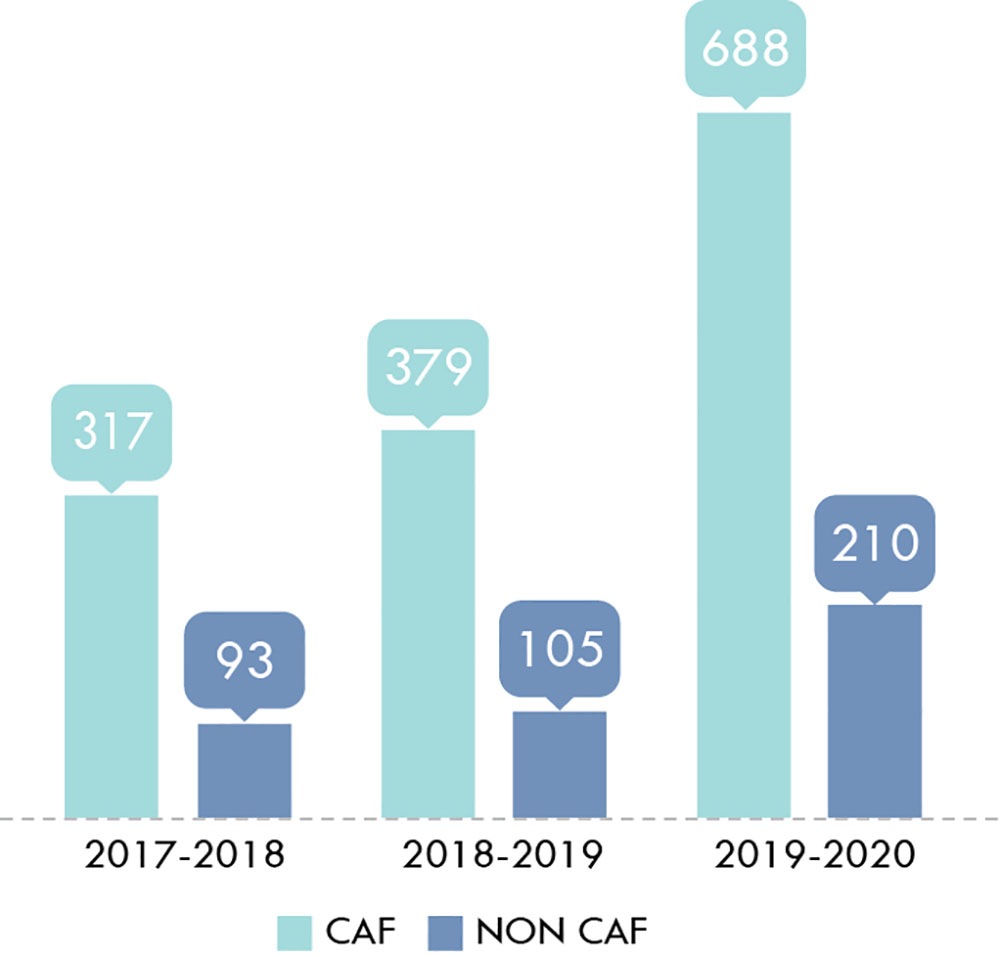
Figure 1 displays the number of individuals who contacted our Response and Support Team in the past three fiscal years. Callers who choose to remain anonymous, family members, and former members are reported as Non-CAF.
Text version of Figure 1
Client Year Number CAF 17-18 317 18-19 379 19-20 688 NON CAF 17-18 93 18-19 105 19-20 210
One reason for these increases is the launch of the Response and Support Coordination (RSC) program. Over 50 CAF members consented to participate in the program, and this resulted in 450 contacts with these clients, other service providers, and the Chain of Command in order provide the support and services they required.
The other most likely reason for these increases relates to the Final Settlement Agreement for the sexual misconduct class action lawsuit. We led the provision of support to class members who at-tended and/or testified at the approval hearings and this resulted in on-going contact with some class members afterwards. We are leading the Restorative Engagement policy measure and have received over 100 calls inquiring about this program and/or the settlement agreement. We are also listed as a primary resource on the class action settlement’s website and many other aware-ness products. The fact that the number of non-CAF individuals, almost half of whom were affected members and potential class members, who contacted us doubled this year supports this.
Similar to previous years, affected persons and the Chain of Command made up the majority of the calls received by the counsellors on the 24/7 line (see Figure 2), followed by third party callers (friends, colleagues, service providers) and family members. Family members or colleagues often contact us to obtain tools to support their loved one or colleague.
Our counsellors also support bystanders who are seeking validation as to whether or not what they witnessed could be considered sexual misconduct or whether they have taken appropriate action. We also receive calls from alleged perpetrators: these have doubled this year compared to last year, indicating an ongoing need to consider this client category.
1 in 5 cases are for male affected members
When we look at the gender distribution for 2019-2020, our statistics demonstrate a lower percentage of male members who contacted us requesting information than in previous years.
Both the 2016 and 2018 Statistics Canada Surveys on Sexual Misconduct in the Canadian Armed Forces suggest that about an equal number of women and men experience sexual assault, because even though women in the CAF are about three to four times more likely to be sexually assaulted than men, they represent less than 20% of the total CAF population.
Note that the numbers of nonbinary CAF members were too small to be used for statistical purposes in this report.
The relatively low proportion of male affected members who contact us suggests that there is an ongoing need for outreach specifically targeting men and to address some of the unique barriers male members might face in seeking help when they experience sexual misconduct.
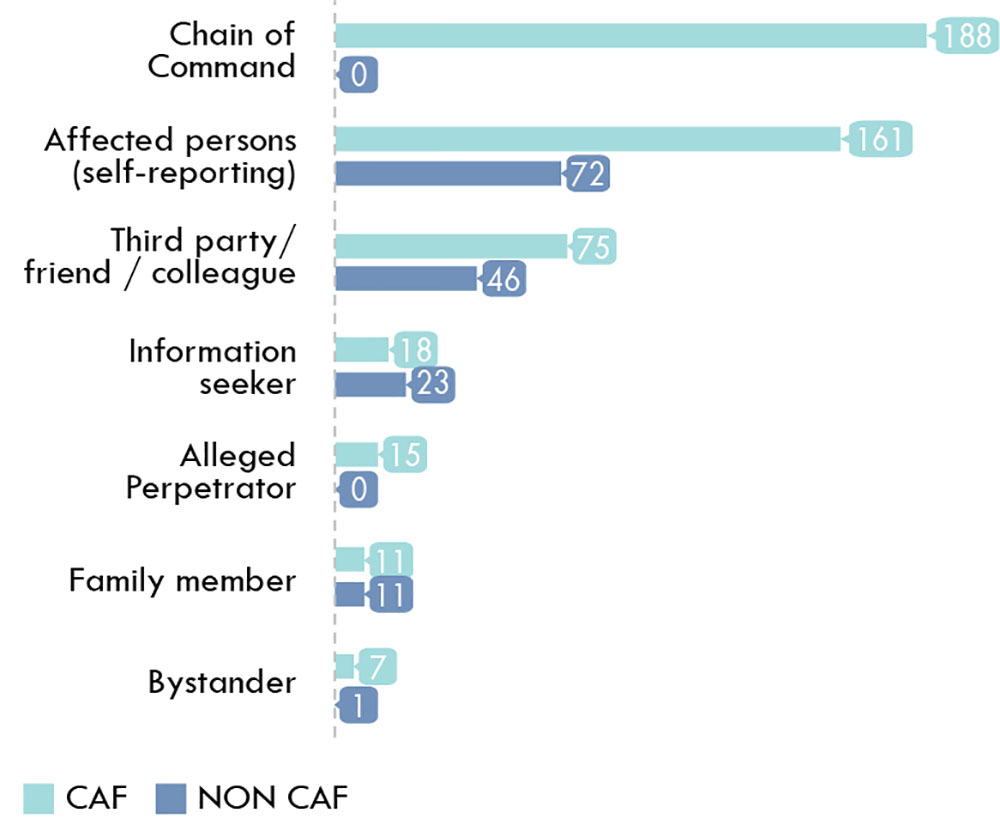
Figure 2 shows the client category for each new case. In this graphic, anonymous callers are reported as Non-CAF.
Text version of Figure 2
Client Client Category Number of Cases Non CAF Affected Person (self-reporting) 72 Third Party / Friend / Colleague 46 Information Seeker 23 Family Member 11 Bystander 1 Total 153 CAF Chain of Command 188 Affected Person (self-reporting) 161 Third Party / Friend / Colleague 75 Information Seeker 18 Alleged Perpetrator 15 Family Member 11 Bystander 7 Total 475 Total Number of Cases 628
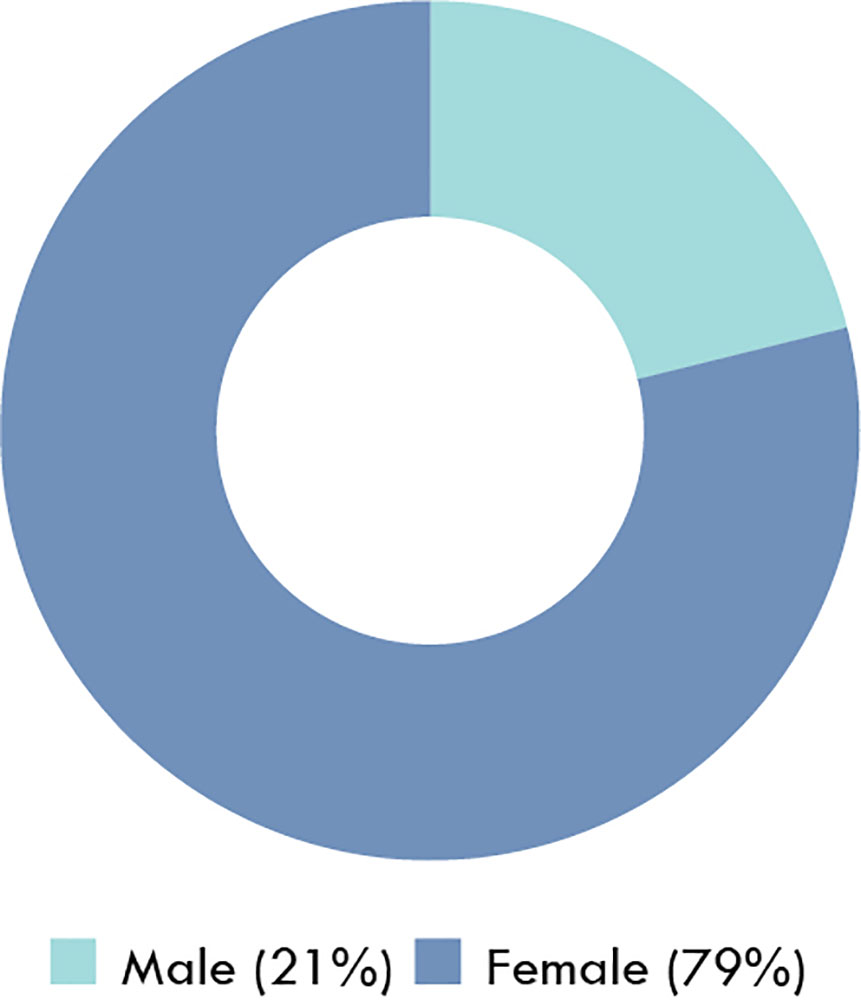
Figure 3 illustrates the gender distribution of affected CAF callers.
Text version of Figure 3
Gender Affected Members Male 34 (≈21%) Female 127 (≈79%) TOTAL 161
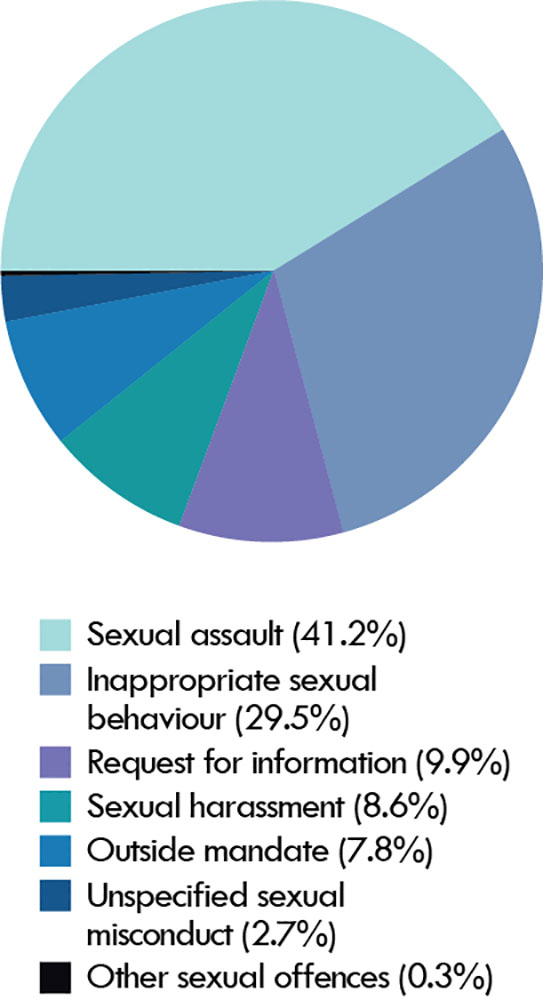
Figure 4 shows the reason for contact for each case.
Text version of Figure 4
Client Reason of Contact Number of Cases Non CAF Sexual Assault 67 Outside Mandate 27 Request for information 22 Inappropriate sexualized behaviour 19 Sexual Harassment 12 Other Sexual Offence 1 Sexual Misconduct – Unspecified 5 - TOTAL 153 CAF Sexual Assault 192 Inappropriate sexualized behaviour 166 Sexual Harassment 42 Request for information 40 Outside Mandate 22 Sexual Misconduct - Unspecified 12 Other Sexual Offence 1 - TOTAL 475 BOTH Sexual Assault 259 Inappropriate sexualized behaviour 185 Request for information 62 Sexual Harassment 54 Outside Mandate 49 Sexual Misconduct - Unspecified 17 Other Sexual Offence 2 - TOTAL 628
Sexual assault and inappropriate sexual behavior are the top two reasons people contact the Centre.
Why Are They Calling? How Do We Support Them?
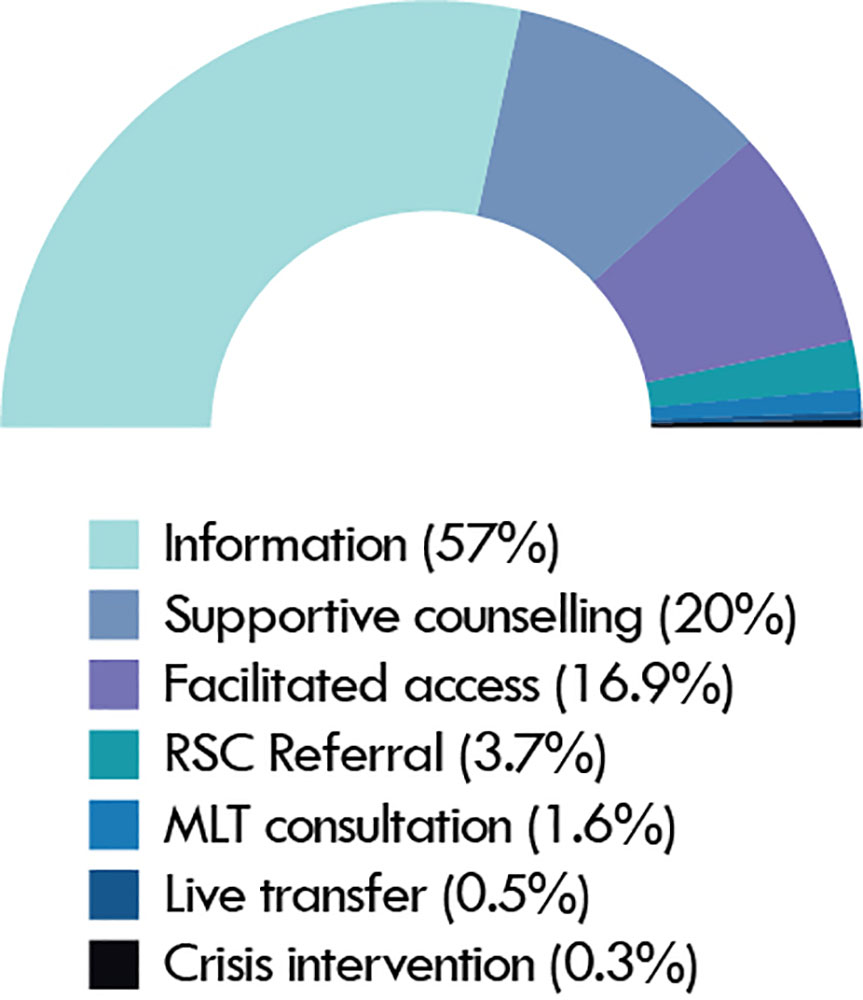
Figure 5 shows the services provided for each contact.
Text version of Figure 5
Client Support Provided Number of Contact Non CAF Information 196 Supportive counselling 69 Facilitated access 33 Consultation with MLT 3 Live transfer 2 Crisis intervention 2 - TOTAL 305 CAF Information 607 Supportive counselling 212 Facilitated access 205 Referral to RSC program 35 Consultation with MTL 20 Live transfer 5 Crisis intervention 2 - TOTAL 1103 BOTH Information 803 Supportive counselling 281 Facilitated access 238 Referral to RSC program 52 Consultation with MTL 23 Live transfer 7 Crisis intervention 4 - TOTAL 1408
Counsellors typically start calls by assessing the individual’s needs which includes conducting risk assessments, discussing the incident, and what steps the individual would like to take, if any. Based upon this, counsellors provide options tailored to the needs of the individual. Whatever the reason for contact or nature of the incident, counsellors almost always provide some information to address the specific situation they have disclosed.
In addition to these services, counsellors can refer members to our military liaison team for assistance or clarification regarding next steps, such as whether and how to report the incident to an appropriate authority.
This includes Chains of Command who contact us for guidance in addressing situations.
Supportive counselling is one of the primary services we provide, regardless of the nature of the incident or the client category. The services offered within a contact with a counsellor can range from a caller seeking information regarding existing resources to a caller needing supportive counselling following an incident of sexual misconduct.
Military Liaison Team
247 contacts were made to the military liaison team, including some that were multiple calls from the same individuals.
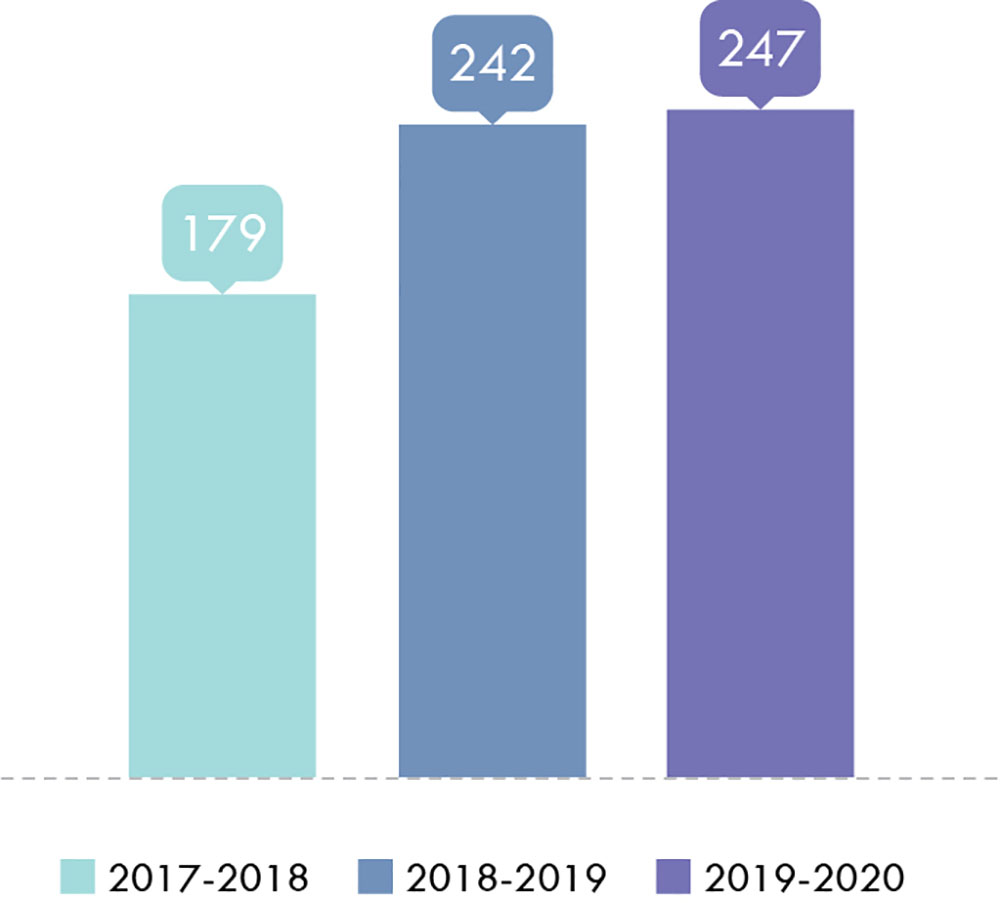
Figure 6 displays the number of contacts to the MLT in the last three fiscal years.
Text version of Figure 6
Year Number of contacts 17-18 179 18-19 242 19-20 247
Most of our personnel consists of civilian employees. That being said, we also have a small integrated Military Liaison Team (MLT) that includes a military police liaison officer (MPLO) from the Canadian Forces National Investigation Service, a senior non-commissioned member, and a senior officer. Together they contribute to the effectiveness of the response and support services provided to CAF members, as they can readily assist affected members and the Chain of Command in navigating and managing what can be sensitive and challenging situations. They discuss procedural and leadership issues, provide information and guidance on administrative procedures, and reach into environments to resolve issues as necessary.
With their extensive experience in the military environment, the MLT works closely with the Response and Support team to ensure that the needs of affected members are always considered regardless of who is calling for information, guidance or support. The MLT does not have access to client information without client consent, and they can provide advice and support anonymously.
The MPLO facilitates reporting in that CAF members can speak with them anonymously to get information on whether or not the incident they experienced might meet the threshold for an offence under the Criminal Code of Canada, and to get information on the investigative process to help them decide whether or not they want to report.
Response and Support Coordination Program
RSC Stats
| # of new clients | 52 |
| Average period of active involvement with RSC during reporting period | 3 months |
| # of contacts with clients | 337 |
| # of contacts with internal and external partners | 111 |
| # of contacts with CoC | 3 |
| Supportive Counselling | 299 |
| Accompaniment | 5 |
| Referral/consult to MPLO | 18 |
| Referral/consult to MLO | 49 |
The Response and Support Coordination (RSC) program provides CAF members who have experienced sexual misconduct with an assigned and dedicated Coordinator to offer on-going support and assistance until such time as the member no longer requires services, withdraws their consent or transitions to civilian services. Specifically, the RS Coordinators help members monitor their cases, advocate on their behalf, accompany them to appointments and offer in-person support, and assist them with workplace accommodations, in addition to the essential functions of providing supportive counselling, information and referrals. RS Coordinators tailor their support and services to their client’s needs.
The first phase of the RSC program, from January to August 2019, was a service scoping exercise that was designed to make some of the more critical services available immediately, to assess demand, and adjust the final program design, policies, and processes. In August 2019, SMRC announced the official launch of the program, in which RS Coordinators are located in the National Capital Region, and provide support primarily by phone and email, but are available to travel to accompany clients whenever needed. We are planning for expansion of access to in-person services across the country, through the establishment of regional centres.
CAF members who have experienced an incident of sexual misconduct can access the RSC program by calling the SMRC’s 24/7 line (1-844-750-1648). Once a referral to the program is received, a coordinator is assigned, makes contact with the member and provides the services that best meet their needs. Members who opt to access a RS Coordinator can still call the 24/7 line as needed during evenings, weekends and statutory holidays.
Restorative Engagement
As part of the CAF-DND Sexual Misconduct Class Action Final Settlement Agreement, approved by the Federal Court in November 2019, SMRC has been mandated to lead the development and implementation of a Restorative Engagement (RE) program.
To accomplish this task, the first thing we did is put together a project team with experience ranging from project management to restorative justice practice and training. We also established an internal RE working group.
The purpose of the RE program is to:
- create a safe space to allow class members' personal experiences of sexual misconduct to be heard, responded to, and acknowledged by DND/CAF;
- contribute to culture change within the military workplace by increasing awareness and understanding of the experiences of class members and the context within which harm has occurred; and
- begin the process of restoring the relationship between class members and the CAF.
The program will provide class members the opportunity to share their experience of sexual misconduct in the military workplace with a Senior Defence Representative (either a senior military member or civilian employee, as requested by the class member) from the CAF, DND or the Staff of the Non-Public Funds (SNPF) in a process facilitated by civilian Restorative Practitioners.
This year, much of the work completed should be considered as the “preparation and analysis” phase of the development of the program. We established the necessary internal capacity (staffing a project team, partnership arrangements, initial design and consultations, etc.), and developed the preliminary costing in order to meet necessary Government of Canada funding approval requirements.
We established an important partnership with Integrated Conflict and Complaint Management (ICCM,) to collaborate on developing and implementing the RE program, in consultation with internal and external stakeholders and subject matter experts. Further consultation will take place in 2020-2021 to finalize the program design.
The program is expected to launch in 2021. More information on RE can be found online at: canada. ca/restorative-engagement.
Training and education
As a result of our expanded mandate, we created a new Training and Education Team this year. This team provides advice on education and training related to sexual misconduct in the CAF and develops content to target specific issues or audiences. They are also responsible for the ongoing delivery, maintenance and oversight of the Respect in the CAF Workshop and mobile app.
Respect in the CAF Mobile App
The Respect in the CAF (RitCAF) mobile app was developed as part of Operation HONOUR to support members dealing with incidents of sexual misconduct and provide them and those who support them with tools and educational information. The app is available for free on app stores, for use with smart phones and tablets using iOS, Android, and Windows phone platforms.
Respect in the CAF Workshop
The RitCAF Workshop is a one-day, interactive session that uses scenarios, discussions and small group practical activities to help members develop and practice skills to recognize, respond to and prevent sexual misconduct, as well as support those affected by it.
The workshop is delivered by Health Promotion specialists under an Agreement with SMRC. These specialists are located at bases and wings across the country, and have considerable expertise after having delivered it for almost five years.
This year, the workshop was delivered to 6,700 participants across Canada. In September 2019, we hosted our yearly, week-long, train-the-trainer session where we trained 13 new Health Promotion specialists to deliver the program. From August 2019 to January 2020, we also conducted 27 Staff Assistance Visits in each workshop delivery location, to monitor the quality and consistency of the workshop delivery.
“Building our Future”
In 2019, we collaborated with the Royal Military College (RMC) in Kingston to pilot a comprehensive prevention program for cadets. Based on small group discussions, the program uses scenarios, practical activities and discussion to develop skills and encourage learning on topics ranging from consent, alcohol, and social media to bystander interventions, difficult conversations and victim support. The topics are intended to provide guidance and awareness on some of the issues faced by the cadet community, and some that they may face as future leaders within the CAF.
The program includes a number of components:
- leadership training for military, academic and support staff;
- a progressive training curriculum across the four year program;
- specialized training for key service and support providers;
- a dedicated Counsellor at SMRC for cadets;
- delivery of the RitCAF workshop; and
- an evaluation framework.
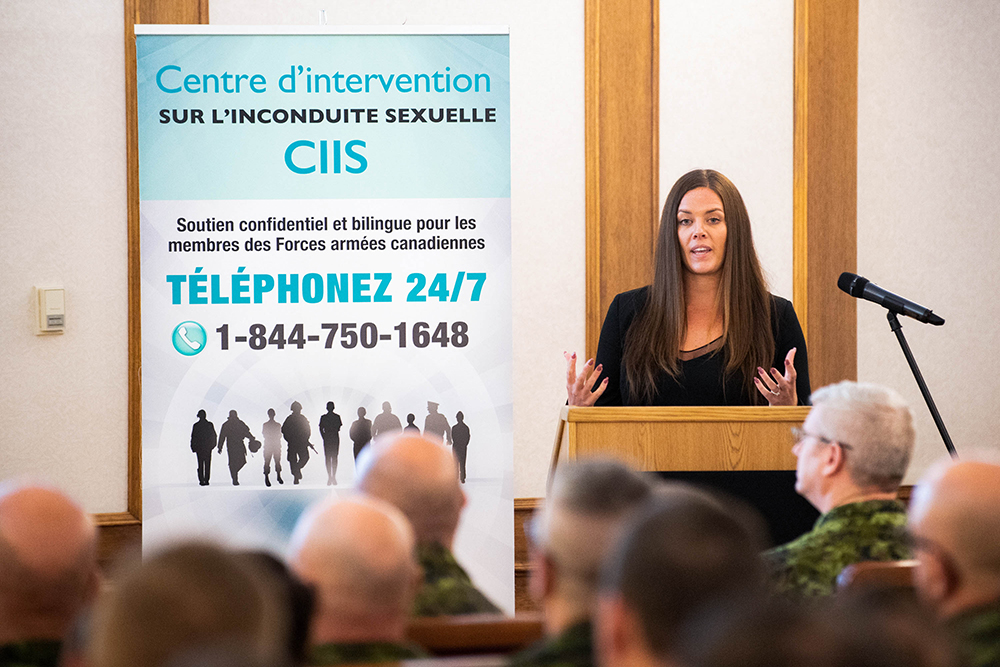
Approximately 220 participants completed the leadership training. They were asked to complete pre- and post-workshop questionnaires to assess the impact of the training and to provide feedback for improvements. Post-workshop, participants reported increased knowledge relevant to responding to a disclosure of sexual misconduct and increased confidence in their ability to respond to such a disclosure. They reported that the training filled gaps in their knowledge and that they would likely use the strategies they learned. They suggested that future leadership training should be conducted in smaller groups to allow for more discussion and interaction.
After the leadership training, and at the request of the Commandant of RMC, we focused the pilot on fourth year students to ensure that they received the benefit of a condensed version of the progressive curriculum prior to graduating, receiving their commissions, and joining CAF units at bases and wings across the country. To provide them with a solid foundation, we brought in Health Promotion facilitators from across the country to deliver the RitCAF workshop to 237 fourth-year Naval/Officer Cadets. Following this, we worked with a group of senior students to develop the progressive curriculum for the first- to fourth -year cadets, to train a small group of peer facilitators, and to support them when they delivered a condensed version of the curriculum to the fourth-year cadets. The rest of the curriculum was supposed to be delivered in the 2020-21 school year, but this was put on hold as a result of COVID restrictions.
Immersive e-Learning Platform
We are currently establishing project requirements for a new immersive e-learning platform, set to launch on the Defence Learning Network (DLN) in 2021. This platform will support Operation HONOUR training and education initiatives and offer members an opportunity to practice handling Operation HONOUR-related situations through scenarios that unfold based on the learner’s decisions.
Expert Policy Advice
Policy Team
Since the Fall 2018 report from the Office of the Auditor General of Canada (OAG) in which they found that CAF members were not yet sufficiently aware of policies regarding sexual misconduct, the DPMC-OpHONOUR team brought together a working group to draft a new DAOD on sexual misconduct. Our Policy Team worked closely with them to provide expert advice on the new order, which will be released in fall 2020.
The OAG report also made a series of recommendations that have had considerable impact on our work, including a significant expansion to our mandate as well as a new operating agreement between the SMRC and DPMC. We are leading on the development of a CAF Survivor Support Strategy that addresses the needs of any member affected by sexual misconduct, ensures a consistent level of service regardless of location, and addresses the unique needs of deployed personnel and members of specialized groups. We have formed a working group of representatives from all service providers and organizations that play a role in supporting affected members. As well, we are consulting with representatives from the class action on this Strategy, as part of the CAF-DND Sexual Misconduct Class Action Settlement.
As well, we engage regularly with the Office of the Judge Advocate General (JAG) on matters related to the needs and interests of victims of sexual offences in the military justice system. To this end, our team began providing input on the drafting of regulations related to implementation of Bill C-77, which was passed in June 2019, and which will add a Declaration of Victims Rights to the Code of Service Discipline [PDF, 437KB], once the regulations are completed. This work will continue in 2020-21.
Our team also provided expertise and worked on a number of other initiatives, which continued into 2020, including:
- the CAF’s comprehensive culture change strategy, called The Path to Dignity and Respect: The CAF Sexual Misconduct Response Strategy (released in October 2020);
- the CAF’s Performance Measurement Framework for Operation HONOUR, which was included in The Path;
- launching a working group to design a program to provide victims of sexual offences in the military justice system with access to independent legal advice; and
- the Presiding Officer Certification Training course, which prepares officers to preside over summary trials for service offences.
Data Analytics Related to Sexual Misconduct
SMRC issued a report entitled “Recommendations to Enhance Understanding and Reporting of Sexual Misconduct in the CAF”, which identified a number of issues related to data collection, analysis, and reporting of sexual misconduct information in the CAF, as well as a number of recommendations to address these issues.
The report has had a couple of tangible results. First, the then-VCDS accepted the report and directed the creation of a working group to address data issues. Second, SMRC worked with the Canadian Forces Provost Marshal on their reporting of sexual misconduct data. This work will continue in 2020-21.
Survey on Sexual Misconduct in the Canadian Armed Forces (SSMCAF)
With the expansion of our mandate in August 2019, the SMRC took on responsibility for overseeing the SSMCAF, which is administered by Statistics Canada. The results of the 2018 survey were published in the spring of 2019, just as our mandate was being reviewed. In September 2019, we hosted a roundtable with a broad range of representatives of the Defence Team to discuss the results of the survey. The roundtable led to several suggestions on how to improve the CAF’s response to sexual misconduct, as well as potential changes to the SSMCAF itself to improve the quality of the results. We then worked with the MINDS program to engage three academics to provide expert advice on the results of the 2016 and 2018 SSMCAF surveys and the roundtable’s suggestions, with a view to identifying some priority action items. They completed their work in March 2020 so this work, together with the priority action items, will be summarized in a report early in fiscal year 2020-21.
The Sexual Assault Centre Contribution Program
In 2019, we launched the Sexual Assault Centre Contribution Program (SACCP) as part of Canada’s overall commitment to responding to gender-based violence, as encapsulated in the Federal Strategy It’s Time: Canada’s Strategy to Prevent and Address Gender-Based Violence. Funding for the program comes from Budget 2018. This program provides financial support to civilian not-for-profit sexual assault centres that are providing a full range of victim and survivor support services and are located near the ten bases or wings with the largest CAF populations: Canadian Forces Base (CFB) Esquimalt; 3rd Canadian Division Support Base Edmonton; CFB Borden; CFB Kingston; 4th Canadian Division Support Base Petawawa; Canadian Forces Support Unit (Ottawa); Saint-Jean Garrison; 2nd Canadian Division Support Base Valcartier; 5th Canadian Division Support Base Gagetown; CFB Halifax.
The objective of this program is to provide opportunities for increased collaboration between community-based civilian service providers and CAF-linked service providers. Through SACCP contributions (of up to $200,000 per project), this initiative aims to ensure that survivors in the CAF community (anyone associated with the CAF, including family members, civilian employees, contractors and others impacted by the CAF presence in their community) are better able to cope with the effects of sexual assault and are better supported to access the services they need.. While nine proposals were approved through a competitive selection process, five agreements were signed with project partners this year, including:
- Sexual Violence New Brunswick in Fredericton
- Sexual Assault Centre Kingston
- Renfrew County Sexual Support Rape Crisis Centre near Petawawa
- Sexual Assault Support Centre of Ottawa
- Athena’s Sexual Assault Counselling & Advocacy Centre near Borden
The SMRC is in the process of signing agreements with the remaining communities, however several of these centres were significantly impacted by the current pandemic.
The External Advisory Council (EAC)
The External Advisory Council (EAC), consisting of eight external subject matter experts, was established in 2018 to advise the SMRC’s Executive Director on issues related to sexual misconduct and provide DND and the CAF with a mechanism to draw upon their experience and knowledge towards the overarching goal of better addressing sexual misconduct within the CAF. The EAC met three times this year and provided advice and information on topics such as: The Path to Dignity and Respect, DAOD 9005-1 Sexual Misconduct Response, the Operation HONOUR Performance Measurement Framework, Survivor Support Strategy, Bill C-77 implementation, and efforts by Military Family Services to address family violence, to name a few.
Parliamentary Appearances
As in previous years, Dr. Preston appeared before Parliamentary committees to provide expert testimony at the:
- House Standing Committee on National Defence (Diversity) on 11 Apr 2019; and
- Senate Standing Committee on National Security and Defence (Bill C-77) on 27 May 2019.
Engagement
3,700 members and civilians attended our presentations across 31 events
As our mandate expanded, so did our efforts to let CAF members across the country know about these changes and to promote our services and programs. For the past few years now, we have been on a mission to take outreach efforts outside of the National Capital Region and to reach people directly in their workplaces across the country, thus ensuring all members know who we are and what support and services we can provide for them. To this end, we always bring at least one of our counsellors to conduct the presentations so that they can give first-hand examples of the type of calls they receive, the work they do, and the services they provide. This way, we also have professionals on site if people disclose having experienced sexual misconduct. This has happened at every base or wing visit we have made, and we typically receive an increase in calls to our 24/7 line following a visit.
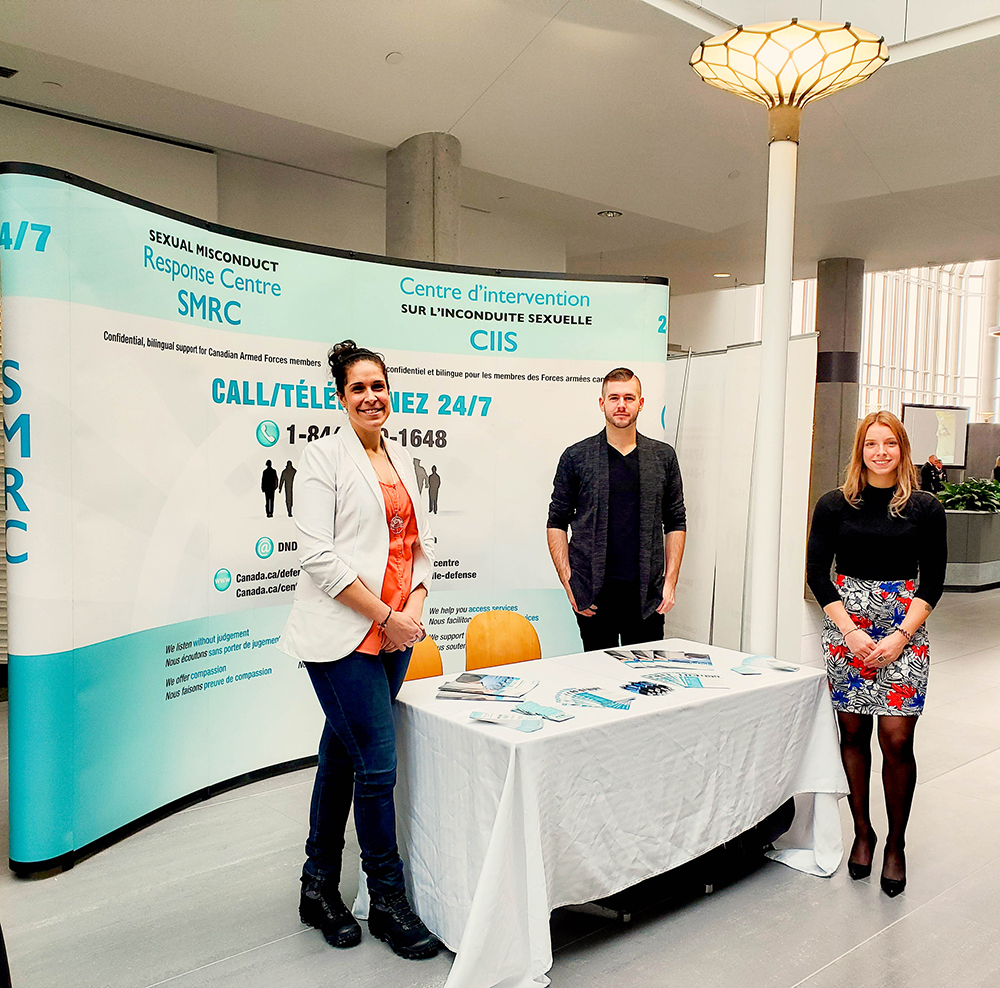
Our presentations during these events are constantly evolving based on feedback we receive through questionnaires or informal discussions with participants. For example, this year we added information about consent and about responding to disclosures based on participant feedback. We also refer to Statistics Canada and Your Say surveys to identify the behaviours, attitudes and perceptions we need to address during our events.
In addition to connecting with CAF members in person, we also use these opportunities to meet with helping partners inside and outside of bases, including CAF service providers and recipients of our Sexual Assault Centre Contribution Program.
In comparison to 2018-2019, where we presented to 2,100 members across 26 events, this year we presented to more than 3,700 members and civilians across 31 events. These numbers are the direct result of increased efforts to reach out to senior CAF leaders to offer in-person outreach. These offers have consistently been well-received, as have our staff during their base visits.
In addition to base and wing visits, we hosted kiosks at several one-day events in the National Capital Region (NCR) such as Bell Let’s Talk Day, Global Ethics Day, and the Health and Wellness Fair. We also held information sessions for CAF support organizations such as the Litigation Team, Transition Group, Road to Mental Readiness staff, and staff of the Office of the Ombudsman.
One of our priorities this year was outreach to Reserve Units. This year, we reached over 500 reservists, including members and command teams. Reservists will continue to be a priority audience in the coming year.
SMRC Online
At the Centre, we assess the visibility of our online presence from a promotion and awareness perspective. The analytics cannot, however, provide contextual information such as how many unique individuals viewed each page and their reasons for viewing the pages.
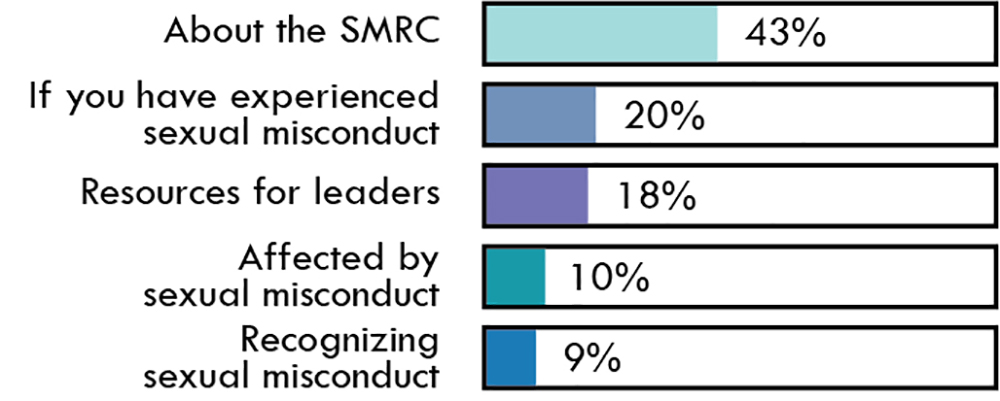
Text version of Figure
About the SMRC 1232 43% If you have experienced Sexual Misconduct 580 20% Resources for leaders 519 18% Affected by Sexual Misconduct 297 10% Recognizing Sexual Misconduct 249 9%
The navigation page, Confidential counselling, received 7217 page views. This represent a 19% increase from last year’s page views. .
In general, the total count of web views remained consistent throughout the year as we began the process of transferring our content from forces.gc.ca to canada.ca. This transfer, which will allow us to have all the information in a single place, is expected to be completed by 2021. As we are currently in the middle of this transition, it is impossible for us to provide accurate statistics to reflect activity on our websites. That being said, once the transfer in complete, we are expecting an increase in activity as we continue to enhance our content and update our website.
Administration
Financial Management
With an approved budget allocation of $4 022 000 for FY19-20, our overall expenditures totaled $4,016,889. The bulk of the expenditures (80%) were salary expenses. Over the course of the year, we employed 35 indeterminate employees, five term employees, four employees seconded from other departments, nine individuals on casual contracts and three students.
Operation and Maintenance expenditures represented $496,019 (12%) of total spending, which includes on-going costs related to the virtual call center in order to support the provision of 24/7 service delivery and the in-service support of the Case Management System.
Overall Expenditures for 2019-2020
| Expenses | Amount |
|---|---|
| Salary | $3,229,663 |
| Operation & Maintenance | $496,019 |
| Outreach/Promotion | $17,111 |
| Stakeholder Relations | $26,382 |
| Training | $74,909 |
| Contribution Program | $172,805 |
| TOTAL | $4,016,889 |
Human Resources
To further enhance our services and increase our capacity to meet our expanded mandate, we made some changes to our organizational structure, and created and filled a number of new positions:
- A second Director position to provide additional leadership capacity;
- 3 counsellors as Response and Support Coordinators;
- Four staff to enhance the Restorative Engagement Development Team;
- Five positions for the Policy Team and one for the Public Affairs Team;
- Three new positions from DPMC to create our Training and Education Team; and
- Two administrative staff.
Space
Given our significant human resource expansion, we outgrew our current workspace this year. As an interim solution, we secured fifteen workspaces in a second location. We are currently working on a long-term plan to meet our space needs, both in terms of capacity and to enable our Response and Support Coordinators to provide in-person services in a confidential space. These plans may well be impacted by the current COVID pandemic, the increase in remote work, and the changing footprint requirements in the long-term.
Moving Forward
We anticipate a number of challenges as we navigate the year ahead in the context of a global pandemic. Our staff began working remotely in mid-March 2020, with a focus on essential services only. For us, this meant continuing to provide 24/7 support to affected members, to support contribution program recipients and to sustain our work on the policy measures we are leading as part of the class action Final Settlement Agreement, specifically, the Restorative Engagement program and consultations to enhance survivor support. Most of our partners and stakeholders experienced the same limitations or more, which impacted our continuing ability to engage with them as required.
This situation will inevitably result in a change in business processes, such as the continuation of remote work to some extent and the increasing use of technology to conduct our work. These factors have resulted in delays on some initiatives as we adjusted. As well, business resumption will likely be slow and asynchronous, suggesting further delays. In light of this, we intend to continue to focus on the priorities we identified prior to the COVID-19 outbreak, but we will modify our intended outcomes to what we believe will be possible under the circumstances.
Because supporting affected members remains our top priority, we will continue to explore the expansion of our services in the new fiscal year. Looking forward, we will enable SMRC personnel to provide greater access to in-person service across Canada.
The Sexual Assault Centre Contribution Program’s partners were also significantly impacted by the pandemic and, as a result, their project development or launch activities have been delayed as they readjust to the realities of a virtual work environment. SMRC will continue to support these partners in providing services to the CAF community, and we will work to approve projects and sign agreements in the remaining five communities targeted by the program.
On the policy front, we will continue to work with the office of the Judge Advocate General on several initiatives. We will provide advice on the regulatory framework for Bill C-77, specifically the Declaration of Victims’ Rights. We will also provide advice on modifications to the Presiding Officer Certification Training course in consideration of these rights in the summary hearing or court martial process. We will work with Statistics Canada to develop the third Survey of Sexual Misconduct in the Canadian Armed Forces, although data collection will likely be delayed due to COVID impacts. Finally, we will continue to promote work on the incorporation of perpetrators into the CAF response to sexual misconduct by, for example, initiating a research project to better understand CAF perpetrators, the circumstances under which they commit these behaviours, and how they are addressed by the CAF. This will help inform prevention and response efforts.
A significant ongoing priority for next year will be the two policy measures of the Final Settlement Agreement that we are leading. We are expecting to finalize the CAF Survivor Support Strategy, including development of a CAF-wide implementation plan, and to complete the design and initial implementation of the Restorative Engagement program. This will involve extensive consultations with external subject matter experts and stakeholders to provide advice on all aspects of the program, and recruitment and training of Senior Defence Representatives and Restorative Justice Practitioners.
As we devote ourselves to delivering on these priorities, we are proud to celebrate the fifth anniversary of the Centre in 2020. It will be an opportunity to reflect on the progress of the past five years and to showcase plans for the next five years.

